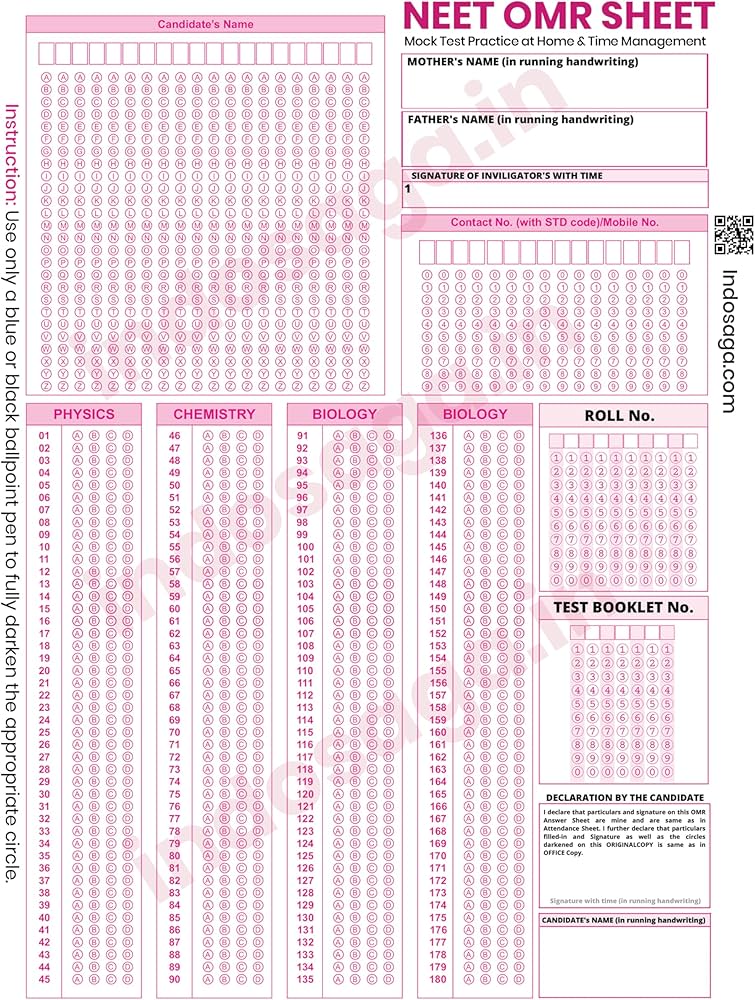IMPORTANCE OF MOCK TESTS IN NEET PREPARATION AND HOW TO ANALYZE YOUR PERFORMANCE
The National Eligibility Entrance test (NEET) is one of the most competitive exams in India, with lakhs of aspiring vying for a limited number of seats in prestigious medical colleges. Given the intense competition and vast syllabus, a strategic and disciplined approach is essential to crack the exam. Among that many tools that aid students in their preparation journey, mock test play a pivotal role. They not only evaluate a student’s knowledge but also prepare them for the actual exam environment.
In this blog, we will explore the importance of mock tests in NEET preparation and provide a comprehensive guide on how to analyse your performance to maximize your results.
Why are Mock tests important for NEET Preparation?

- Stimulates Real Exam Conditions
Mock tests recreate the actual NEET environment. Sitting for a 3-hour test under timed conditions helps students adapt to the pressure of the real exam. The format, question distribution, and OMR filling practice give a sense of familiarity, reducing exam-day anxiety.
- Time Management Skills
A significant challenge for NEET aspirants is mastering time efficiency during the exam. The test demands solving 180 questions in 180 minutes—leaving just 60 seconds per question. Regular mock tests train candidates to strategically allocate time across sections and question formats, helping them discern when to prioritize speed over persistence or vice versa.
- Identifies strengths and weakness
Every student has strong and weak areas. Regularly taking mock tests helps identify these patterns. You might be great at Biology but struggle with Physics numericals. Recognizing this early allows you to redirect your efforts and tailor your study plan accordingly.
- Boost Accuracy and Speed
Consistent practice with mock tests enhances both speed and accuracy—a key balance for NEET success. Aspirants develop time-saving strategies, refine their ability to eliminate incorrect options efficiently, and minimize avoidable errors, all of which are vital for maximizing scores in the exam.
- Builds Confidence
Observing gradual improvement in your mock test scores over time boosts self-assurance. Even initial setbacks can strengthen determination—by analysing mistakes, refining strategies, and seeing measurable progress, you build the mental stamina to remain disciplined and attentive, which is crucial for long-term NEET preparation.
- Helps in Revision
Mock tests act as a powerful revision tool, comprehensively evaluating your understanding of the syllabus while ensuring key concepts remain fresh. By routinely revisiting topics through these simulations, you strengthen memory recall and deepen retention—turning passive learning into active, exam-ready knowledge that withstands the test of time.
- Evaluates from Strategy
Some students prefer starting with Biology, others with Chemistry. Mock tests allow you to experiment with different approaches and find the one that suits you best. You can try different methods of attempting the paper and finalize a strategy that maximizes your score.
How to Analyze your performance In NEET Mock Tests
Taking mock tests is only half the battle. The real improvement happens during performance analysis. Here’s a step-by-step guide on how to do it effectively:
Step 1: Record your scores systematically
Maintain a dedicated notebook to log:
- Test number and date
- Overall score
- Subject wise scores (Physics, Chemistry, Biology)
- Number of correct, incorrect and un-attempted questions.
- Time taken for each section
Step 2: Review the Entire Paper
Spend at least 2-3 hours analysing the mock test after completion. Break it down as follows:
Correct Questions
- Did you get it right because you understood the concept or was it a lucky guess?
- Could you have solved it faster with a better method?
Incorrect questions
- Identify the reason for the mistake
- Conceptual misunderstanding
- Calculation error
- Misreading the questions
- Silly mistakes
- Guessing
Un-attempted questions
- Why did you skip them?
- Lack of time?
- Unfamiliar with the concept?
- Low confidence?
Step 3: Categorize your mistakes
- Conceptual errors: revisit NCERT, theory.
- Application errors: practice more problem of similar type.
- Careless mistakes: double check calculations
Step 4: Relearn and Revise
Once you’ve identified weak concepts, relearn them immediately. Use reference books, coaching material, or online lectures. Follow it up with topic-wise practice to solidify the concept.
Step 5: Evaluate your Time Management
- Are you spending too much time of physics?
- Are you rushing through biology?
- Biology – 45 minutes
- Chemistry – 55 minutes
- Physics – 60 minutes
- 15 minutes buffer for revision or tough questions
Conclusion
Mock tests transcend routine practice—they function as reflective tools, exposing your preparedness level, highlighting errors, and mapping your developmental trajectory. By embedding these assessments into your daily NEET routine and critically evaluating results through a lens of improvement, you can shift from achieving middling marks to securing elite, competition-leading ranks.
NEET is not just about hard work — it’s about smart work, strategy, and consistent evaluation. And mock tests are your smartest allies in this journey.




